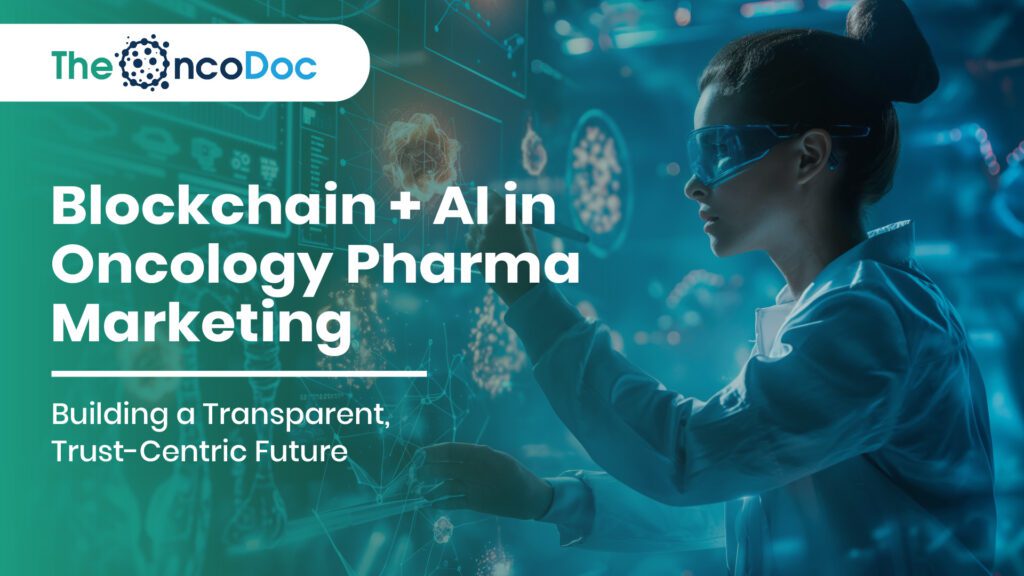1. Introduction: Redefining Oncology Marketing Through Technology
The fusion of Blockchain and Artificial Intelligence (AI) is ushering in a paradigm shift in oncology pharma marketing. In a field where trust, accuracy, and patient-centricity are paramount, these two technologies work synergistically to eliminate data silos, enhance security, and create actionable intelligence. Traditional oncology marketing has long relied on persuasive narratives and segmented outreach; however, patients and healthcare providers now demand verifiable proof, ethical practices, and personalized engagement. By integrating blockchain’s immutable transparency with AI’s predictive capabilities, oncology pharma brands can move from persuasion-driven marketing to evidence-based storytelling backed by data integrity.
2. The Foundational Problem: Trust Deficit in Oncology Ecosystems
Despite advancements in oncology, the ecosystem remains fragmented and plagued with mistrust:
- Data Silos: Patient health records, treatment outcomes, and trial data remain disconnected across hospitals, research centers, and pharmaceutical companies, reducing efficiency and limiting comprehensive care.
- Data Integrity Concerns: Errors in manual entries and risks of data manipulation undermine trust in oncology research and treatment protocols.
- Limited Patient Control: Patients often have no visibility over their health data or its use, creating reluctance to share critical information needed for innovation.
- Crisis of Counterfeit Drugs: Because of their high demand and cost, oncology medications are particularly targeted by counterfeiters, endangering patient safety and brand credibility.
Blockchain and AI present an integrated solution, offering trust, security, and ethical engagement as key pillars.
3. Blockchain as the Trust Engine in Oncology Marketing
Blockchain technology acts as a decentralized, tamper-proof ledger, addressing integrity and transparency issues at their core.
3.1 Immutable Clinical and Marketing Data
Every data entry, whether from clinical trials, supply chains, or patient portals, is cryptographically linked, ensuring a tamper-proof audit trail. For pharma marketers, this enables verifiable claims, making campaigns evidence-driven rather than perception-driven.
3.2 Patient-Centric Data Ownership
Blockchain-powered health IDs allow patients to:
- Control who accesses their medical records.
- Choose participation in research or marketing campaigns.
- Monetize anonymized contributions to data-driven studies.
3.3 Transparent Oncology Supply Chains
Pharma brands can track each oncology drug from manufacturer to patient delivery. Features include:
- Real-time monitoring of biologics’ temperature-sensitive transport.
- Tamper-proof records of drug authenticity.
- Quick tracing of counterfeit product origins.

4. AI as the Intelligence Layer
While blockchain secures “what” is happening, AI explains “why” and predicts “how” to optimize future outcomes.
4.1 Predictive Marketing and Personalization
AI leverages blockchain-secured datasets to:
- Build hyper-personalized marketing campaigns based on patient treatment histories and consented data.
- Predict future oncology treatment demands.
- Tailor physician outreach using behavioral insights.
4.2 Real-Time Anomaly Detection
AI continuously scans blockchain entries for suspicious trends, such as:
- Sudden spikes in adverse reactions to a drug.
- Data entry inconsistencies.
- Fraud in trial data submissions.
4.3 Unlocking Deeper Oncology Insights
By analyzing anonymized blockchain data, AI enables:
- Discovery of new biomarkers.
- Prediction of cancer recurrence risk.
- Correlation mapping between lifestyle and oncology outcomes.
5. The Blockchain + AI Synergy: Ethical Oncology Pharma Marketing
Combining blockchain’s integrity with AI’s analytical intelligence creates auditable marketing ecosystems:
- Marketing campaigns can transparently demonstrate verifiable outcomes from trials.
- Every consent interaction, data share, and campaign execution is recorded, enabling compliance with GDPR and HIPAA.
- Trust is positioned as a core brand differentiator in oncology pharma marketing.
6. Transforming Oncology Clinical Trials
Clinical trials are the backbone of oncology drug development, but they face challenges like recruitment inefficiencies and fraud. Blockchain and AI revolutionize this process.
6.1 Blockchain-Enabled Consent Management
Blockchain technology uses smart contracts to securely record and manage patient consent. This system allows participants to easily grant, withdraw, or update permissions, ensuring complete transparency and ethical oversight throughout clinical trials. Patients gain more control over their data, fostering trust and willingness to participate.
6.2 Real-Time AI Trial Monitoring
AI-powered analytics continuously monitor trial data in real time, detecting subtle trends or irregularities that may indicate safety risks or inefficiencies. Early identification of these patterns enables faster intervention, reducing trial delays and improving overall patient safety and outcomes.
6.3 Verifiable Trial Outcomes
Blockchain’s immutable ledger ensures that all trial data remains tamper-proof, eliminating risks of manipulation or inaccuracies. Pharmaceutical companies can confidently share verified trial results in regulatory submissions, publications, and marketing campaigns. This strengthens brand credibility and reassures patients and stakeholders that results are accurate, ethical, and scientifically valid.
7. Patient Empowerment and Participation
In oncology, patient trust is the foundation of meaningful engagement, and emerging technologies like blockchain and AI are transforming patients from passive participants into active contributors to their care and research.
7.1 Digital Health Wallets
Patients can now maintain secure, encrypted digital health wallets that store critical medical data, including:
- Comprehensive genomic profiles for personalized treatment strategies.
- Imaging results and diagnostic scans for accurate progress tracking.
- Treatment response records to support care adjustments and future therapies.
These wallets allow patients to selectively share information with healthcare providers, caregivers, or researchers, enabling better collaboration and informed decision-making while maintaining full control over their data privacy.
7.2 Incentivized Research Participation
Blockchain technology introduces token-based incentives that reward patients for voluntarily sharing anonymized health data for research purposes. By giving patients tangible benefits for participation, pharma companies encourage greater collaboration and trust, while turning patients into active stakeholders in innovation. This approach accelerates clinical discoveries, improves trial diversity, and fosters a culture of transparency.
Together, blockchain and AI create a patient-first ecosystem, empowering individuals to play a central role in oncology advancements while ensuring data integrity and ethical engagement at every step.
8. Counterfeit Drug Prevention: A Marketing Imperative
The oncology sector faces significant challenges due to counterfeit medications, resulting in billions of dollars in losses and serious risks to patient safety. Implementing blockchain and AI-driven systems offers a robust solution, safeguarding supply chains and reinforcing brand integrity.
8.1 End-to-End Supply Chain Verification
Blockchain technology creates an immutable, transparent record of every step in a drug’s lifecycle, ensuring authenticity and regulatory compliance. This includes:
- Manufacturer certification, confirming that products are produced in authorized facilities.
- Logistics monitoring, with AI tracking temperature-sensitive biologics to guarantee quality during transit.
- Retail pharmacy verification, allowing every vial to be authenticated before reaching patients.
This system builds an incorruptible audit trail, making it easier to trace and eliminate counterfeit products swiftly.
8.2 Marketing Impact
By leveraging blockchain verification, marketers can highlight authenticity features as a powerful trust-building differentiator in campaigns targeting patients, caregivers, and healthcare providers. Transparency in drug sourcing enhances brand credibility and positions pharma companies as leaders in safety and ethics. These trust-driven messages not only protect patients but also strengthen loyalty, reinforcing oncology brands’ commitment to delivering safe, reliable therapies.
9. Oncology Pharma Marketing Campaign of the Future
With the integration of AI and blockchain, oncology marketing campaigns will evolve from generic outreach to highly personalized, precision-driven strategies.
- Campaigns rooted in verifiable trial data will strengthen trust and elevate brand credibility among patients and healthcare professionals.
- AI-powered analytics will determine the most effective communication channels for each oncology segment, ensuring messages reach the right audience at the right time.
- Blockchain’s transparent consent management guarantees ethical engagement, empowering patients with full control over their data.
This approach establishes marketing as a trusted, evidence-based component of cancer care delivery.
10. Blockchain for Regulatory Compliance
Pharma companies navigate an increasingly complex web of global regulatory standards in oncology marketing and drug distribution. Blockchain technology provides a decentralized, tamper-proof ledger that creates automated audit trails for every transaction, data entry, or consent record. This ensures seamless compliance with international frameworks like GDPR, HIPAA, and regional health regulations. By eliminating manual record-keeping, blockchain reduces administrative costs and the risk of human error while enabling real-time audits. For pharma brands, this not only simplifies regulatory adherence but also demonstrates transparency, fostering trust with patients, providers, and regulators. Compliance becomes a strategic advantage rather than an operational challenge.
11. AI-Driven Predictive Oncology Insights
AI models can forecast cancer prevalence, drug demand, and response rates by studying large-scale, verified blockchain data.

12. Personalized Patient Marketing in Oncology
In oncology, personalization is no longer optional, it’s a core expectation from patients seeking trust and relevance.
- AI-driven analytics craft hyper-targeted messages informed by biomarkers, treatment history, and patient behavior, delivering content tailored to individual needs.
- Blockchain-secured consent records provide a transparent, verifiable trail for every data exchange and marketing interaction, ensuring patients feel safe and informed.
This synergy allows pharma brands to deliver meaningful, ethical engagement while respecting privacy and compliance. Personalized campaigns elevate patient experience, strengthen trust, and position oncology companies as partners in care, not just providers, driving stronger connections across the care journey.
13. Transparency as a Brand Differentiator
Brands integrating blockchain and AI position themselves as trust-first pharma leaders. Oncology patients are more likely to engage with companies prioritizing transparency.

14. Oncology Market Trends and Growth Potential
The oncology pharma sector is projected to exceed $400 billion globally by 2030. Blockchain and AI adoption are critical for market differentiation.

15. Overcoming Challenges in Implementation
Despite immense potential, blockchain and AI adoption face hurdles:
- Interoperability of healthcare systems.
- Upfront infrastructure costs.
- Regulatory complexity.
- Need for data literacy among marketing teams.
Solutions include phased adoption, public-private partnerships, and industry-standard frameworks.
16. Case Scenario: Launching a Blockchain-AI Backed Oncology Therapy
The launch of an oncology therapy powered by blockchain and AI showcases a future-ready marketing model:
- Patient Consent: Smart contracts establish transparent, unchangeable consent terms, empowering patients to manage participation and data sharing.
- Real-Time Monitoring: AI continuously analyzes trial data, identifying early signs of adverse events or unexpected treatment responses, ensuring rapid intervention.
- Transparent Supply Chains: Blockchain tracks each vial from production to patient delivery, guaranteeing authenticity and minimizing counterfeit risks.
- Personalized Marketing: AI leverages verified trial outcomes to create customized, evidence-based campaigns for physicians and patients, enhancing relevance and trust.
- Trust-First Brand Positioning: Marketing emphasizes verifiable results, transparency, and ethical engagement, positioning the brand as a trusted healthcare partner.
This approach demonstrates how integrating blockchain and AI creates a patient-centric ecosystem where every step, from research to commercialization, builds credibility, accelerates adoption, and reinforces oncology brands as leaders in innovation and care.
17. Future Outlook: Ethical AI-Driven Oncology Marketing
The future of oncology pharma marketing lies in blockchain and AI-powered ecosystems that prioritize ethics, transparency, and trust. Marketing teams will leverage these technologies to deliver evidence-backed messaging, enabling patients and providers to access verifiable drug data and AI-driven treatment predictions. Blockchain-secured platforms will ensure every communication is traceable and consent-driven, while AI personalizes interactions to meet individual patient needs. This evolution transforms marketing into a supportive, data-driven experience rather than a promotional tool, empowering patients with actionable insights. By embracing these innovations, pharma brands will lead with integrity, fostering long-term trust and redefining oncology engagement globally.
Conclusion
The integration of blockchain and AI in oncology pharma marketing is far more than a technical upgrade, it represents a profound transformation of the entire ecosystem. In an industry where precision, transparency, and ethical practices are essential, these two technologies create a secure, verifiable, and patient-first approach to marketing and engagement. Blockchain establishes trust through immutable records and transparent data sharing, while AI converts that trusted data into actionable insights, predictive analytics, and hyper-personalized campaigns. Together, they enable pharma brands to confidently showcase verifiable treatment outcomes, protect patients from misinformation, and create evidence-driven marketing strategies.
For patients, this synergy delivers greater empowerment, giving them ownership over their data and the confidence to participate in research and treatment decisions. For providers and regulators, it ensures compliance, authenticity, and ethical alignment at every level. The future of oncology marketing is no longer persuasion-driven; it is proof-based and trust-centric, creating a robust foundation where every patient touchpoint is meaningful and verifiable. As this model evolves, brands that embrace blockchain and AI will not only stand out for innovation but also for empathy, becoming true partners in cancer care. This transformation marks a critical leap toward a future of transparent, intelligent, and patient-driven oncology ecosystems.
The Oncodoc team is a group of passionate healthcare and marketing professionals dedicated to delivering accurate, engaging, and impactful content. With expertise across medical research, digital strategy, and clinical communication, the team focuses on empowering healthcare professionals and patients alike. Through evidence-based insights and innovative storytelling, Hidoc aims to bridge the gap between medicine and digital engagement, promoting wellness and informed decision-making.



